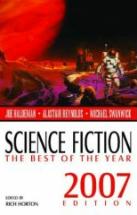 "Another Word for Map is Faith" by Christopher Rowe
"Another Word for Map is Faith" by Christopher Rowe "Okanoggan Falls" by Carolyn Ives Gilman
"Saving for a Sunny Day, or, The Benefits of Reincarnation" by Ian Watson
"The Cartesian Theater" by Robert Charles Wilson
"Hesperia and Glory" by Ann Leckie
"Incarnation Day" by Walter Jon Williams
"Exit Before Saving" by Ruth Nestvold
"Exit Before Saving" by Ruth Nestvold
"Inclination" by William Shunn
"Life on the Preservation" by Jack Skillingstead
"Me-Topia" by Adam Roberts
"The House Beyond Your Sky" by Benjamin Rosenbaum
"A Billion Eves" by Robert Reed
"Life on the Preservation" by Jack Skillingstead
"Me-Topia" by Adam Roberts
"The House Beyond Your Sky" by Benjamin Rosenbaum
"A Billion Eves" by Robert Reed
Science Fiction: The Best of the Year 2007 edition, edited by Rich Horton, includes four stories that were not reviewed by Tangent in their original publications. Links below will take you to the review of each story in the publication it was originally published in.
"Another Word for Map is Faith" by Christopher Rowe
"Okanoggan Falls" by Carolyn Ives Gilman
"Saving for a Sunny Day, or, The Benefits of Reincarnation" by Ian Watson
"Okanoggan Falls" by Carolyn Ives Gilman
"Saving for a Sunny Day, or, The Benefits of Reincarnation" by Ian Watson
Jafar Bloom has made an art of death. An anonymous someone has hired Toby to make sure Bloom has an audience, and Toby has a feeling that he better figure out who it is and why. Sure, it’s a bit pokey in the beginning and Robert Charles Wilson‘s prose isn’t something I’d rave about, but the science fiction of "The Cartesian Theater" is some of the best in recent memory. It takes recent developments in neuroscience and technology and blends them with age-old questions of philosophy to create a story that made me late for a family luncheon. As I like both my family and free food, I don’t think there is any higher praise than that.
There is not now, nor has there ever been, a well in the cellar. Sure, the police say that they were unable to retrieve the body of John Atkins—an odd visitor with an odder story—from the well in the basement, but it’s very important to remember that the well does not exist. Ann Leckie‘s "Hesperia and Glory" is a tale of consensual reality and a lost prince from a Victorian Mars calls to mind the best works of Sir Arthur Conan Doyle, Robert E. Howard, H. P. Lovecraft, and Michael Moorcock. If you’re in need of a pulp sci-fi fix, I can’t recommend this story enough.
"Incarnation Day" by Walter Jon Williams
One of the perks of being an industrial spy in Ruth Nestvold‘s "Exit Before Saving" is that you can become other people. This isn’t in the dressing up, walking with a limp, and putting on a fake accent sense of becoming someone else. No, this is in the downloading your brain into a bunch of goo which then forms itself into the exact physical likeness of someone else sense. Mallory, our protagonist, enjoys this. She enjoys it a lot. She enjoys it so much, in fact, that it’s going to kill her if she doesn’t stop.
The problem is, I just didn’t care. The ideas here are interesting, and I like that the narrative falls apart in sync with Mallory’s brain. It happens too fast, though. The reader never gets to know anything about Mallory beyond her addiction and denial, which isn’t the sort of thing that makes me connect with a character. Without that connection, I’m left with a well-written, interesting story that just doesn’t work.
"Inclination" by William Shunn
"Life on the Preservation" by Jack Skillingstead
"Life on the Preservation" by Jack Skillingstead
Planets don’t just pop up in the middle of the solar system. Sure, there are probably some planet-sized objects that we’ve not discovered out in the Kupier belt, but something Earth-sized, near the Earth, and not seen in all of recorded history? Couldn’t happen. And, yet, Murphy, Edward, Sinclair, and Vin’s ship crashed into something that suggests otherwise.
The tone and structure of Adam Robert‘s "Me-Topia" is very similar to Frank R. Stockton‘s ubiquitous "The Lady or the Tiger." Both have an engaging, storybook-light narrative that makes for a good read right up to the climax. Then the author heads off on vacation, asking the readers if they wouldn’t mind going ahead and finishing up for him, thank you very much. It’s one of those things that only works the first time you read it in junior high English and is annoying after that. Still, the likable characters and compelling mystery more than compensate for my dislike of the open ending, making this story well worthy of its spot in this anthology.
"The House Beyond Your Sky" by Benjamin Rosenbaum
"A Billion Eves" by Robert Reed
Publisher: Prime Books (May 2007)
Price: $7.99
Paperback: 400 pages
ISBN: 0843959045